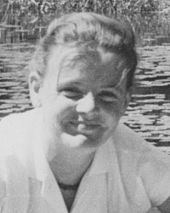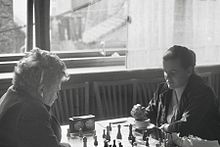Juliane dog
Juliane Hund née Meyer (born September 23, 1928 in Darmstadt ; † December 9, 1999 in Leverkusen ) was a German chess player .
In correspondence chess , she won the German championship twice, the silver medal at the first women's chess Olympiad, and the first women's European championship in 1998.
Profession and private life
Juliane Hund grew up in Königsberg (Prussia) before the end of the Second World War , studied law in Marburg , Lausanne (1952/53) and Frankfurt am Main , where she passed her first state examination. During this time she learned the game of chess from her father in Giessen. In Frankfurt am Main she founded a student chess club, where she met her future husband better in 1955. In 1957 she married the mathematician and chess player Gerhard Hund and founded a world-famous German chess family with him.
Her four daughters Susanne van Kempen (née Hund, * 1958), Barbara Hund ( Grand Master of women 1982, * 1959), Isabel Hund ( FIDE Champion of women, * 1962) and Dorothee Lampe (née Hund, * 1966) became strong chess players. In 1961 the family moved from Darmstadt to Leverkusen, where they took in Allart Meyer (* 1956, † 2006) as a foster son, also a chess player. She became a grandmother in autumn 1993, and two granddaughters followed in 1998.
Juliane Hund died in December 1999.
Famous ancestors of hers are Johannes Schneidewind and August Wilhelm Reinhart .
Achievements as a chess player
Close chess
In addition to German championships, Juliane Hund took part in many international tournaments. Instead of vacation, she went to chess tournaments with her family. The first joint tournament took place between Christmas and New Year's Eve 1973, for which she traveled to Berlin with 5 children and her husband. Here she met the Berlin International Master Heinz Lehmann , who also took part in the tournament. Tournaments in France, Switzerland, Spain, Prague, Iceland and Finland followed. She also attended the Chess Olympiads in Siegen 1970, Lucerne 1982, Thessaloniki 1984 and 1988, Dubai 1986 and Manila 1992.
In 1959 Juliane Hund first won the Hessen championship for women, then she came second in the German championship in Dahn in 1959 behind Friedl Rinder , 13 days before the birth of her daughter Barbara. She took part very often in German women's championships, taking second place in Dahn in 1959, in Zell am Harmersbach in 1975 and in Brilon in 1981. In 1989 she won the 1st German Senior Women's Championship in Bad Wörishofen .
At the 6th Thuringian family chess tournament in 1997 in Erfurt, Juliane and Gerhard Hund won the team classification. In addition, she played several times in the senior world championships , each time with the men, most recently in 1997 in Bad Wildbad.
Correspondence chess
Because of the birth of her children, she began correspondence chess in 1959. In 1964/1967 she won the 5th German correspondence chess championship for women. She qualified for the final of the 1st Correspondence Chess World Championship for women. In the final (1968-1971) she scored 4.5 points from 9 games, Olga Rubzowa became world champion . With the national team (Juliane Hund, Edith Mechelke, Elke Beyer and Rita Heigl ) Juliane Hund won the silver medal at the 1st Correspondence Chess Olympiad for women. She won against Éva Karakas from Hungary , among others . The Soviet national team (Olga Rubzowa, Marta Schul , Luba Kristol and Lyudmila Belawenez ) won the gold medal.
In 1975 she received the title of International Correspondence Chess Champion . When she reached 50 percent in the "men's tournament" Eino Heilimo Memorial Tournament II (1978–1982), she was awarded the "men's title" international correspondence chess master . She won against the former correspondence chess world champion Lucius Endzelins (Australia). This game was published with comments by Barbara Hund. GM Duncan Suttles (Canada) won the memorial tournament .
In 1979/83 she became German correspondence chess champion for the second time at the 11th German Championship. In addition, Juliane Hund took part in the 21st German Correspondence Chess Championship 1987/90 for men. For information on their successes and international titles, see the 1994 booklet "20th German Correspondence Chess Championship 1985/88 and 21st German Correspondence Chess Championship 1987/90".
In 1998 Juliane Hund won the 1st European Women's Correspondence Chess Championship with (+7 = 1 −0), which (preliminary plus final round) lasted more than 11 years. Juliane Hund was able to win the title just in time for her death just because she played the last game by email.
Youth work
Juliane Hund gave chess lessons at different schools in Leverkusen and in the chess club Schachfreunde 1959 Bergisch Neukirchen. Her Bergisch Neukirchen youth became youth team champions in 1977 with one boy and seven girls for teams of eight in the Rhein-Wupper chess district. In addition, until shortly before her death, she was the tournament director of the chess youth in the Middle Rhine Chess Association and in the Rhein-Wupper chess district.
Works and other engagement
During her time in Darmstadt (1955/61) she translated a book written in French by Pierre Naslin into German. The title of the German edition is the structure and operation of number calculators . She was also politically active in Leverkusen and took part in various training courses.
Honors
She received the Golden Pins of Honor from the Middle Rhine Chess Association and the Rhein-Wupper Chess District. The Chess Federation of North Rhine-Westphalia awarded her the certificate of honor in 1993 and the BdF ( German Correspondence Chess Federation ) in 1999 the Golden Badge of Honor.
Web links
- Replayable chess games by Juliane Hund on 365Chess.com (English)
- Juliane Hund at the World Correspondence Chess Federation ICCF (English)
Individual evidence
- ^ Diploma from the University of Lausanne (Switzerland), November 5, 1954
- ↑ Meyer's chess dictionary. Meyers Lexikonverlag, 1993, p. 129 (with picture), ISBN 3-411-08811-7 .
- ↑ Susanne Hund received the Silver Badge of Honor of the German Chess Federation in 1991
- ↑ Susanne Hund received the Golden Badge of Honor of the German Chess Youth in 1992
- ↑ Willy Iclicki: FIDE Golden book 1924-2002, Euroadria, Slovenia, 2002, p. 78.
- ↑ Dorothee Hund won the 13th German Girls' Championship in 1986
- ^ Obituary for the death of Juliane Hund
- ↑ Some of Juliane Hund's ancestors, such as Johannes Schneidewind (Johann Schneidwein) and August Wilhelm Reinhart
- ↑ Barbara Hund: My way to success. Walter Rau Verlag, 1st edition 1983, p. 7.
- ^ German women's championship 1959 in Dahn
- ^ German championships for women
- ↑ 6th Thuringian family chess tournament, 09.-11. May 1997 in Erfurt
- ↑ 7th World Championship for Seniors
- ↑ 1st Correspondence Chess World Championship for women Cross table and illustration of the participants
- ↑ ICCF - 1st CC LADIES OLYMPIAD FINAL , table of the International Correspondence Chess Federation
- ^ 1. Correspondence Chess Olympiad of Women / 1st Ladies Correspondence Chess Olympiad
- ↑ Eino Heilimo Memorial II
- ↑ Barbara Hund: My way to success. Walter Rau Verlag, 1st edition 1983, pp. 150/51.
- ↑ 20th German Correspondence Chess Championship 1985/88 and 21st German Correspondence Chess Championship 1987/90. Deutscher Fernschachbund (BdF) April 1994, pp. 83-178 and pp. 183-184.
- ↑ 1st Correspondence Chess European Championship for Women
- ↑ Structure and mode of operation of number calculators by Pierre Naslin (author), Juliane Hund and Klaus Prause (hardcover - 1961)
| personal data | |
|---|---|
| SURNAME | Dog, Juliane |
| ALTERNATIVE NAMES | Meyer, Juliane (maiden name) |
| BRIEF DESCRIPTION | German chess player |
| DATE OF BIRTH | September 23, 1928 |
| PLACE OF BIRTH | Darmstadt |
| DATE OF DEATH | December 9, 1999 |
| Place of death | Leverkusen |





